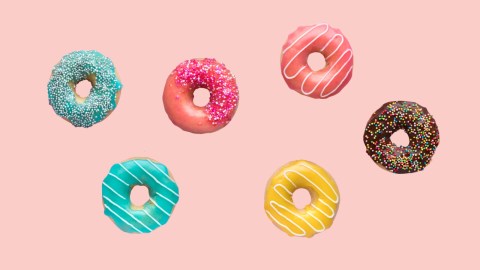Low-carb diets cause depression

- There is a link between diet and depression, but the direction of causality is unknown. Does diet cause depression, or does depression cause changes in a person’s diet?
- A study employing Mendelian randomization concludes that a low-carb diet causes depression.
- While increasing carbohydrate intake might lower the risk of depression, it increases the risk of other problems, like type 2 diabetes.
When in a depressed mood, it is common for people to binge eat. In fact, people suffering from depression often find themselves snacking their way into eating disorders, which often further aggravates their depression. Clearly, there is some relationship between depression and diet.
There are many hypotheses for why depressed people eat a lot of carbs. One hypothesis suggests that carbohydrate-rich diets provide the brain with extra tryptophan, which is metabolized to produce serotonin, one of the “happy hormones.” Another hypothesis hints at the role played by the body’s stress response.
But scientists are still in the dark regarding causality. Are people with a carb-rich diet more prone to depression, or does depression make people eat a lot of carbohydrates? A new study published in the journal Human Behavior sheds light on this question. It has found that low-carb diets are not simply linked to depression, but actually cause depression.
A natural experiment
To determine if there is a causal relationship between diet and depression, the researchers used Mendelian randomization (MR). MR takes advantage of the natural genetic variation in the population: People carry different variants of genes (known as alleles), which are randomly assorted during the formation of sperm and egg cells. These alleles are associated with a variety of outcomes, including how we look and behave and our predisposition to disease. Because we cannot pick our own alleles and because they are randomly “assigned” to us, this experimental design is akin to a clinical trial.
Scientists using MR to study causal relationships make use of publicly available data from genome-wide association studies. With data from thousands of genomes, these studies identify genetic variations that are associated with particular traits. For example, an allele can be said to be linked to depression if it’s likelier to occur in depressed individuals.
In this research, the authors sourced genetic variants linked to diet and major depressive disorder from two different genome-wide association studies. From the study on diet, the authors identified genetic variants that robustly predict the relative intake of carbohydrates. In other words, they identified alleles that predicted whether a person is likelier to eat a lot of carbs. They also noted that the variants associated with high carbohydrate intake predict a lower risk of depression.
Then, they looked in the other direction. In the study on major depressive disorder, the authors identified alleles associated with depression. They then determined if these genetic variants were also associated with an increased likelihood of eating carbs. They were not.
Together, this indicates that causality flows in one direction: A low-carb diet can cause depression, while a high-carb diet can help prevent it. Specifically, the authors calculated that increasing carbohydrate intake by one standard deviation (roughly 335 Calories) resulted in a 58% lower risk of major depressive disorder. Further analysis revealed that a higher body mass index (BMI) reduced this protective effect.
Diet and depression
Major depressive disorder impacts hundreds of millions of people. This study shows that increasing carbohydrate intake could help reduce the risk of depression. However, this is not a panacea. A high-carbohydrate diet causes its own problems, such as type 2 diabetes.





